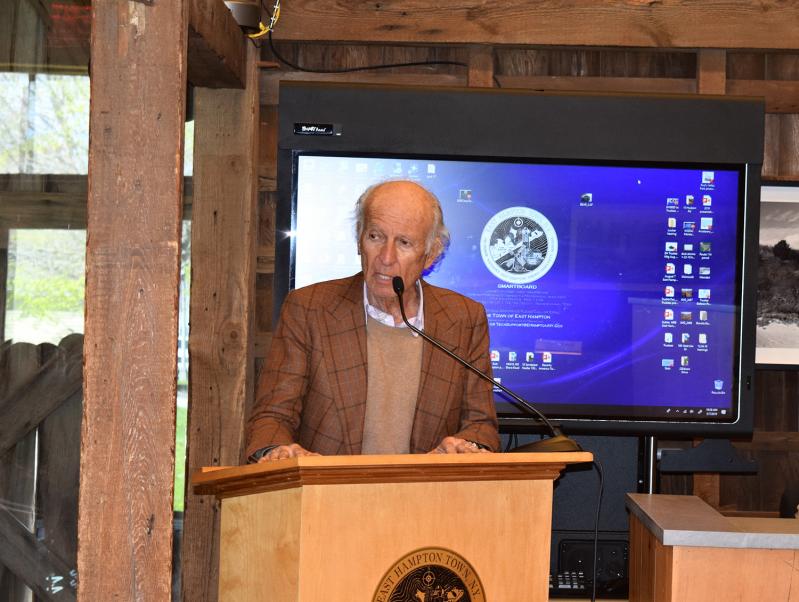The arguments turned to the metaphysical on Tuesday when members of the East Hampton Group for Wildlife implored the East Hampton Town Board to ban hunting on one weekend day, with several speakers referring to the spiritual and healing qualities of nature. But the recent attention the group has put on the issue brought pro-hunting residents out as well, and the board was told that hunting is both a tradition that should not be curtailed and a means to control a deer population that is destroying forests and endangering residents. Members of the Group for Wildlife, asserting that residents are unsafe in the woods during hunting season, asked the board in February to institute a hunting ban on one weekend day. In March, Bill Crain, the group’s president, complained to the board that its recommendations have been ignored, and that the composition of the town’s Wildlife Management Advisory Committee, to which it took the proposal in December, is biased in favor of hunting. The committee is made up of officials from multiple agencies, including the town’s Land Acquisition and Management, Natural Resources, and Planning Departments; the Nature Preserve Committee; the Nature Conservancy, and both the Group for Wildlife and the East Hampton Sportsmen’s Alliance, but attendance at its meetings has been sparse. Members of the committee voted 3-to-1 last month not to recommend a one-weekend-day ban during hunting season. Ron Delsener, a concert promoter and animal rights activist who has a house in East Hampton, said on Tuesday that “as a kid out here . . . we had days off on a Sunday. We don’t have that in America anymore. We don’t sit back and relax, and say this is Shangri-La. . . . We forgot what it was like to breathe the air again.” Mr. Crain said that gunfire “disrupts people’s sense of peace,” causing increasing distress since a longtime state ban on weekend hunting was lifted in 2014. “I can’t take the gunfire; we can’t enjoy our weekends,” he said. “I use the word ‘enjoy,’ but it goes deeper than that. . . . In natural settings, people get a sense of peace and calm that they really can’t get anywhere else. It’s vital to their well-being. In natural settings, people are also inspired by nature’s beauty. The beauty of natural surroundings touches them, lifts their spirits, gives a sense of goodness in the world.” Animals, he said, “deserve a chance for this peace too.”Those in favor of hunting, Mr. Delsener said, are “a vicious group of people.” Arrows have been shot into trees on his property, he told the board, and he has been threatened. The biggest problem, he said, is the proliferation of fences to keep deer off residential property. On Middle Lane, where he lives, “It’s just a world of hedgerows, so the deer are driven into the road. . . . We have deer fever out here, it’s like the marijuana scourge: ‘The deer are here!’ Well, so are Mexicans at the railroad station,” he said, likening the issue to anti-immigrant sentiment. “We’ve got to learn to live with these deer, learn to live with people of color, embrace them, they’re good people. . . . Why don’t you think about doing the right thing and not kissing tush to these other guys? You don’t have to do that anymore.”Because of increased hunting after the weekend ban was lifted, deer have sought refuge in residential areas, said Carol Buda. “The culling mechanism is cars,” she said, referring to deer-vehicle collisions. “More collisions, and in a sense expanded hunting, has caused a danger to people — more people in accidents with the deer. The speeding cars are the new predators.” She urged the board to seek a compromise with hunters “so the majority population of nonhunters has some access given back for whatever their issue is. For some it’s noise, for some it’s safety.”Yuka Silvera told the board that her petition asking for a one-weekend-day ban now had 343 signatures, 314 of which “came from your voters, taxpayers.” Many of the people she has spoken with “have been disturbed by hunting. Many don’t want any hunting at all.”It is important that the board “take into consideration the desires of all of their residents,” said Ellen Crain. The Wildlife Management Advisory Committee, she said, “really needs to be revitalized and become a committee that reflects the sentiment of the whole town, so you can rely on its decisions to guide you.” But Hugh Miles, who spoke to the board at its meeting last Thursday, again defended hunters’ rights, and told the board that hunting is carefully managed during the limited span in which it is permitted. Those uneasy about being in the woods during hunting season can walk their dogs at the dog park or on the beach, he said. Richard Mamay, who said he has been hunting for 50 years, said that hunting is already limited. His son works five and a half days per week, he said, and his opportunity to hunt is already effectively limited to one day. Steve Griffiths of the Sportsmen’s Alliance told the board that hunting season spans just four months per year, and there are many trails where hunting is prohibited. “I have to laugh when they say they are scared,” he said of those opposed to hunting. “There hasn’t been an accident, but at least two people were killed by deer-versus-car accidents.” Their proposal, he charged, “has nothing to do with what they claim,” rather, it is an effort to eliminate hunting incrementally. “They never give hunters credit for keeping the deer population in check,” he said. But Mr. Crain pushed back against complaints about the danger posed by ticks, for which deer are blamed, and the destruction of forest understory by an unchecked deer population. “The association between the elimination of deer and preservation of ecosystems, the research is not at all consistent,” he said. “Statements made there sound correct, but they’re really not, if you dig into the research.” If the town insists on eliminating deer, “we can do it in a humane way,” he said, urging study of a contraception program. Deer hunting with firearms was permitted from Jan. 6 to Jan. 31 this year. Seven of those days fell on weekends. Hunting rules and regulations are set by the state and enforced by state conservation officers, as well as by federal Fish and Wildlife agents where migratory birds are concerned, according to the town’s hunting guide for the 2018-19 season. While local municipalities cannot pass laws regulating hunting seasons, they can decide whether to permit hunting within their jurisdictions. Private landowners can also permit hunting on their properties.The Wildlife Management Advisory Committee, Supervisor Peter Van Scoyoc said on Tuesday, “may not represent the overall feelings of the community at large.” He called it “incumbent on us to take into account all of the conversations. We heard from the public today, in the past, received petitions on various sides of this discussion, and it will ultimately be up to the town board to decide whether or not we want to move forward” with any changes to existing regulations.
Villages

A Success by Any Standard
Donovan Solis, the owner of Georgica Services, an auto shop known for its high-end, rare, and classic cars, started working there as a teenager — washing windshields at the gas pumps — and at first, he wasn’t even getting paid to do it.

Corner Bar Open by July 4? Maybe
Kelly and John Piccinnini, the new co-owners and sole operators of 1 Main Street in Sag Harbor — more familiarly known as the Corner Bar — spoke this week about the future of the community staple and meeting place.

Item of the Week: The Final Voyage of the Elmiranda
Much to the chagrin of her captain, the bark Elmiranda never stood a chance once she was caught in one of our area’s thick fogs in April 1894.
Your support for The East Hampton Star helps us deliver the news, arts, and community information you need. Whether you are an online subscriber, get the paper in the mail, delivered to your door in Manhattan, or are just passing through, every reader counts. We value you for being part of The Star family.
Your subscription to The Star does more than get you great arts, news, sports, and outdoors stories. It makes everything we do possible.

